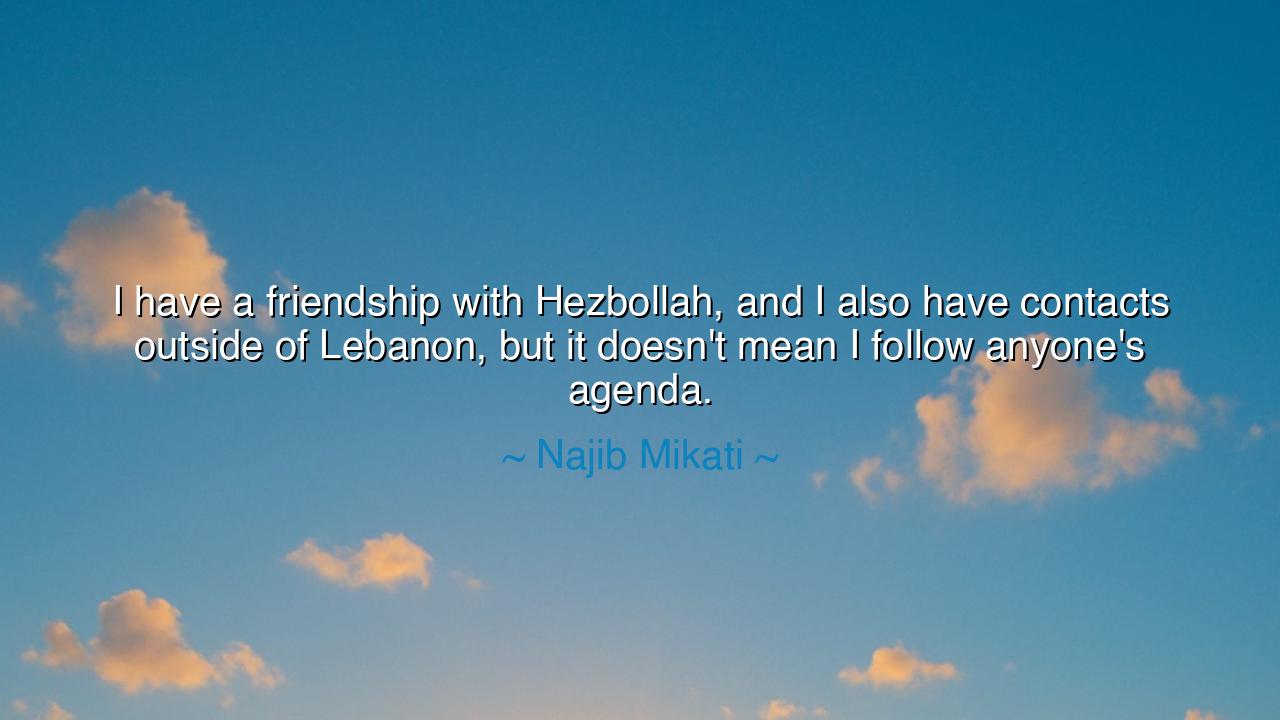
I have a friendship with Hezbollah, and I also have contacts
I have a friendship with Hezbollah, and I also have contacts outside of Lebanon, but it doesn't mean I follow anyone's agenda.






In his measured words, Najib Mikati, a statesman shaped by the storms of Lebanon, reveals a truth that transcends politics: “I have a friendship with Hezbollah, and I also have contacts outside of Lebanon, but it doesn't mean I follow anyone's agenda.” Behind this declaration lies the ancient struggle between loyalty and independence — between the need to live in peace with many and the duty to remain true to one’s own conscience. Mikati’s statement is not one of defiance, but of balance; not of isolation, but of sovereignty. It speaks to a man — and to a nation — caught between forces greater than themselves, yet striving to keep their soul intact.
The origin of this quote rests in the crucible of Lebanese politics, a realm where allegiances are complex, and neutrality itself demands courage. As Prime Minister, Mikati stood at the crossroads of sectarian divides, foreign influences, and local loyalties. His “friendship with Hezbollah” was not a declaration of submission, but an acknowledgment of reality: that to govern Lebanon, one must speak with all, for every faction is a reflection of the nation’s fractured heart. Yet in the same breath, he asserts his independence of will — a refusal to become the instrument of any single ideology or power. It is the timeless cry of those who must walk the narrow path between diplomacy and integrity.
His words echo through history’s chambers, resonating with the voices of other leaders who stood between loyalty and principle. Marcus Aurelius, emperor and philosopher, ruled an empire that tested his soul with endless alliances and betrayals. He wrote in his Meditations: “Be like the cliff against which the waves break — yet it stands firm, and the raging waters fall still around it.” So too did Mikati strive to be that steadfast rock — open to friendship, yet unmoved by manipulation. He reminds us that the highest form of leadership is not the power to command, but the strength to remain unclaimed.
There is also a moral depth in his declaration. Friendship, in its truest form, is not submission but mutual respect. One may walk beside another without being led. To befriend all is a sign of peace; to follow none is a sign of freedom. Mikati’s words, therefore, speak to the essence of human wisdom: that true friendship never demands the death of the self. Whether in politics or in life, a man must learn to hold his ground — to engage without surrender, to listen without losing his voice. Such balance requires not cunning, but clarity of spirit.
Consider the story of Mahatma Gandhi, who during his struggle for India’s freedom maintained dialogue even with those who opposed him. He broke bread with the British, conversed with Muslims, Hindus, and skeptics alike — yet he followed no one’s agenda but his conscience. His friendships were bridges, not chains. Through them, he showed the world that peace is not born from isolation, but from the strength to stand in the midst of difference, anchored in inner truth. In this light, Mikati’s sentiment becomes universal: a reminder that unity need not erase individuality.
The lesson embedded in these words extends beyond politics. It teaches that in a divided world, we must learn to live among contradictions without becoming their prisoner. It urges us to cultivate friendship with those unlike ourselves, to listen to many voices, yet to let none silence our own. Whether in personal life, community, or nation, the art of balance — of walking between loyalty and liberty — is the highest art of all. For he who stands alone in pride will fall; and he who bends too easily will break.
In practical action, this means learning to practice respect without allegiance, to build bridges without surrendering your foundation. Speak with many, but let your heart belong to principle. Befriend widely, but let truth remain your only master. In a world where every side clamors for our loyalty, let Mikati’s wisdom be your compass: to remain open but unowned, friendly but free, understanding yet uncorrupted. For the greatest strength is not domination — it is independence of soul in a world of ceaseless persuasion.






AAdministratorAdministrator
Welcome, honored guests. Please leave a comment, we will respond soon